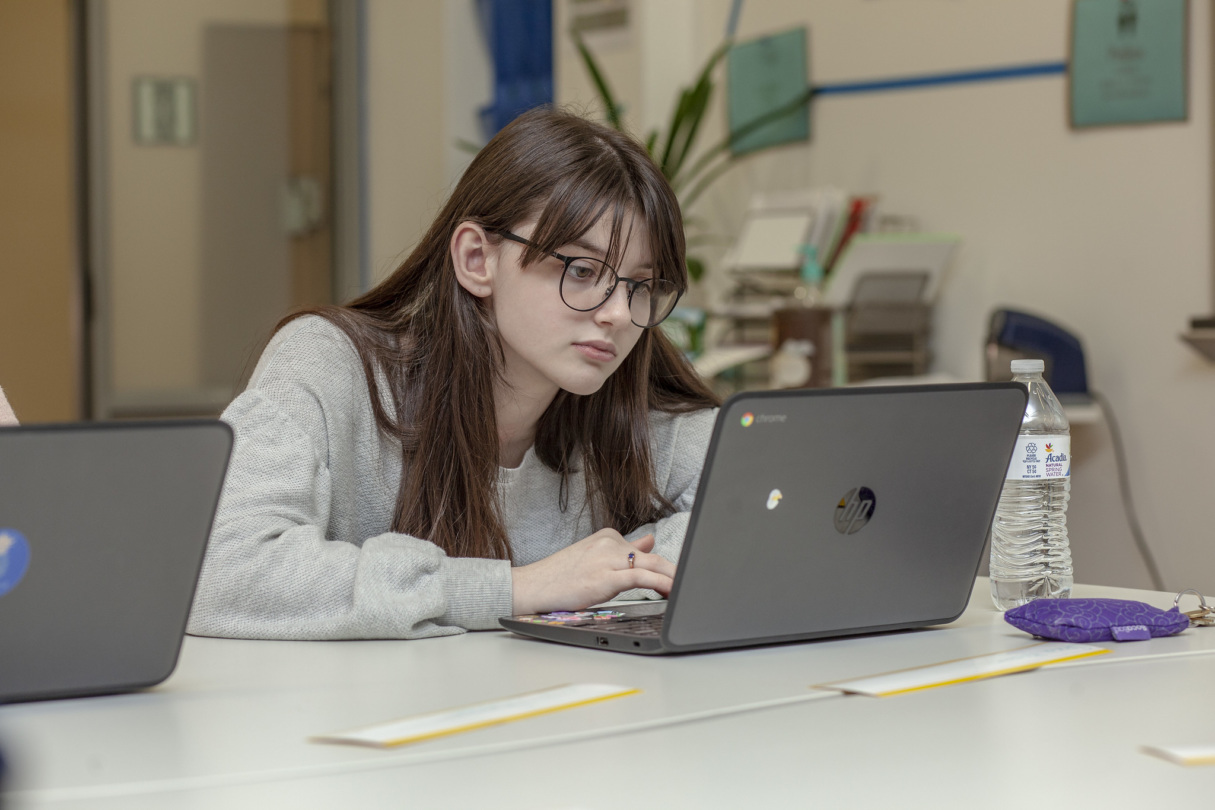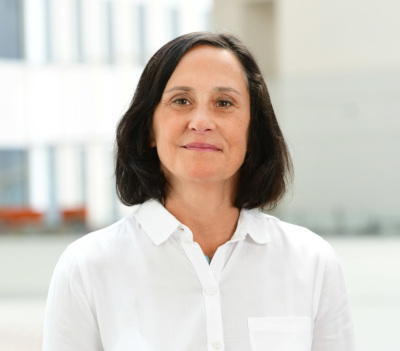
More Info
Shea Haslam, a ninth-grader at The Morgan School in Clinton, Connecticut, works on a Checkology lesson in her journalism class. Photo by Meredith Whitefield for the News Literacy Project.
Students empowered to push back against social media algorithms
While teenagers might annoy adults by questioning everything around them, their pushback can be a good thing. This is especially true when young people have the skills and abilities to make informed judgments. Educators who use the NLP’s Checkology® e-learning platform see this when students challenge social media algorithms that skew their view of the world.
“Just being aware of online personalization gives them some power to resist,” educator Mary Kate Lonergan said. She teaches eighth grade social studies at Eagle Hill Middle School in Manlius, New York.
Lonergan uses a variety of resources to give students a strong foundation in news literacy. They can then apply what they’ve learned when researching a controversial issue during a cross-curricular social studies/ELA project. The students soon discover how algorithms determine what content they see. Middle school students understand that their TikTok feed looks different from a classmate’s feed, based on the ads they click or topics they search, she said. However, they are surprised at how fast algorithms can send them deeper into a rabbit hole, narrowing their view. “They don’t have the concepts to identify what’s happening.”
Illustrating pitfalls of algorithms
Lonergan’s students demonstrated their grasp of the topic by creating memes that addressed the pitfalls of algorithms. Using humor, well-known people and animated characters, they conveyed the insidiousness of personalized ads, online privacy issues and filter bubbles.
“Creating media is an important piece of news literacy. It demystifies the process, and they can see that intentional choices are being made — content has a purpose,” Lonergan said. “If you understand how this works, you can’t be taken advantage of.”
Her students reflected on their discoveries:
- “Whenever I am on social media I can identify when I have fallen into rabbit holes and be able to stop myself from getting sucked in too much.”
- “This project opened me up to making sure that I use social media for its benefits, so that it can help make me — not break me.”
- “What’s important to know is that echo chambers that you find yourself in can be good on one side and bad on the other, and companies profit off of that.”
How algorithms and technology impact our lives
Similar discoveries are taking place nearly 1,000 miles away in Kerise Broome’s 10th grade English honors class at James Island Charter High School in Charleston, South Carolina. Her students start the year by studying the role of technology in their lives. “I truly feel that we’ve got to make up some ground where technology evolved too quickly, and we weren’t teaching news literacy as part of our standard curriculum,” she said.
She challenges her students to write essays that address the following questions: In what ways do you see that technology is outpacing our ability to control it and presenting us with threats to our existence? What can we do to solve these problems?
“The overwhelming majority of them are looking at online personalization the way most adults are looking at it,” she said. “They feel like victims and that they are the product. They don’t like that idea at all.”
‘They do understand what the dangers are’
To give them the content knowledge needed to answer those tough questions, Broome uses a combination of resources and methods. This includes the Checkology lessons “InfoZones,” “Misinformation” and “Understanding Algorithms,” the documentary film The Social Dilemma, and peer-to-peer class discussions. “A lot of the information was surprising to them, but they do understand what the dangers are,” Broome said.
The essays were excellent, she said, because of the students’ knowledge, interest in and engagement with the topic. They also shared thoughts on how to address the challenge of navigating the information landscape.
Some of their insights:
- “Checking multiple trusted websites instead of using social media as our main source of information is a way we can help solve the problem of receiving incorrect information about important topics we should be correctly educated on.”
- “Social media has implemented a special way to take and keep our attention, by using our interests and goals and showcasing them in our personalized feeds.”
- “The best thing you could do in order not to get caught up [in conspiracy theories] is to [do] your research! Fact check! If you see something on social media that you know or think is fake, don’t repost it.”
Lessons resonate
Broome has seen how teens value the skills and insight that becoming news-literate brings. “It just really echoed some of the things they have seen. It’s the most relevant thing I teach all year long,” she said.
Lonergan weaves news literacy into her curriculum throughout the year and believes it’s never too early to start. “Middle schoolers are ready for these conversations and want to talk about it,” she said. “News literacy is the vehicle through which we engage in the content. It’s not another thing to teach; it’s another way to teach.”
